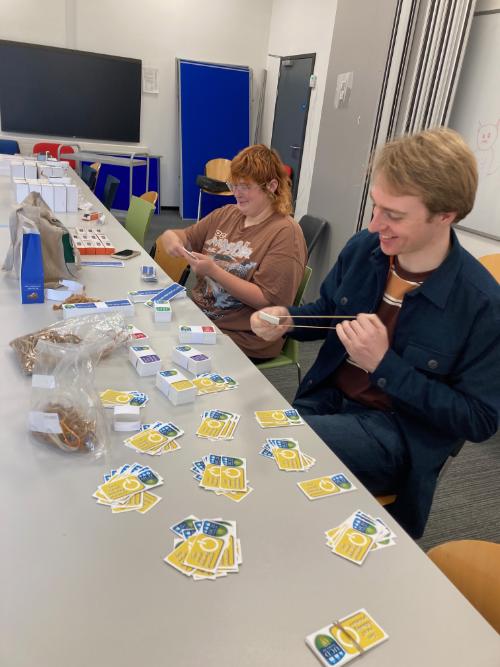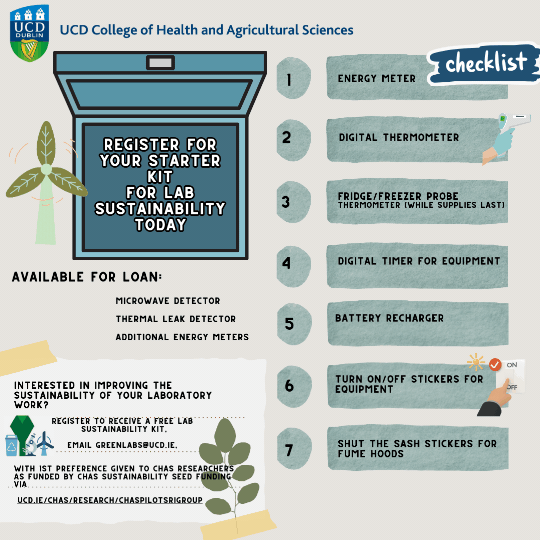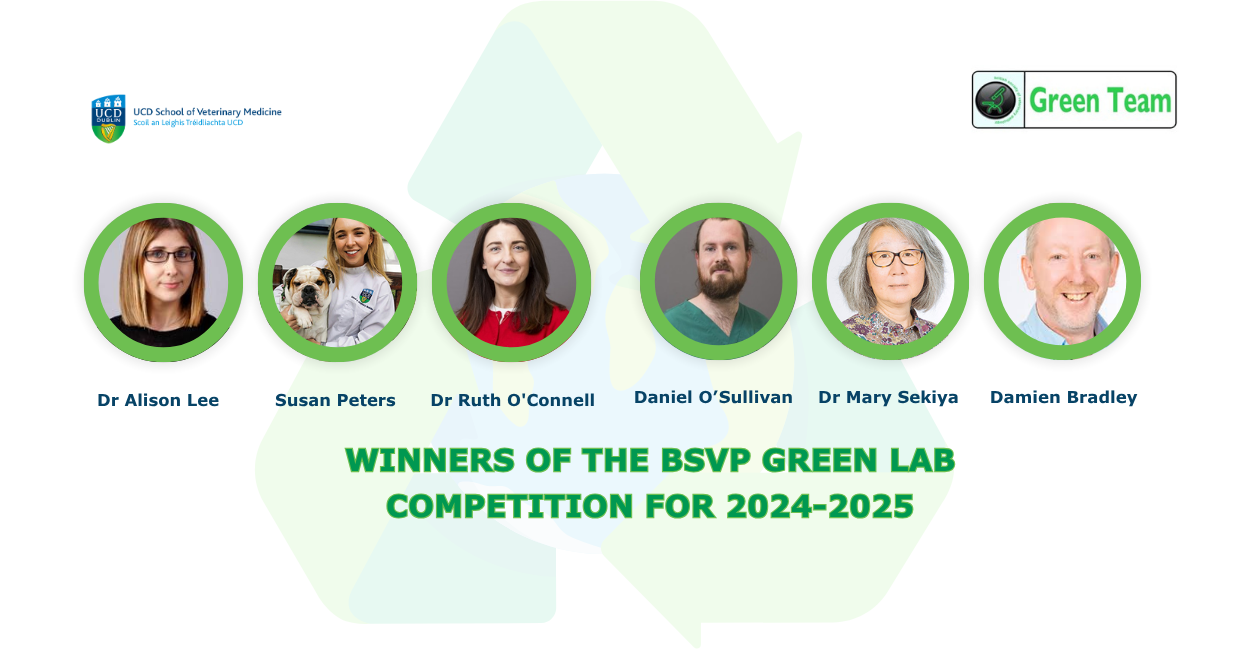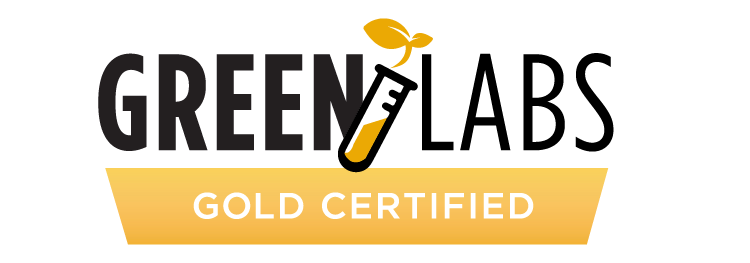CHAS - Funded Laboratory Sustainability Kits: Feedback and Fodder
Wednesday, 27 August, 2025
Share

Written by: Mary Sekiya
In 2024, I was awarded a small grant through a sustainability funding programme sponsored by the College of Health and Agricultural Sciences (CHAS). I worked with Tristan Russell (then of the School of Veterinary Medicine) and together, we developed a laboratory sustainability kit. We included items that we thought would be helpful for those starting on a sustainability journey without the need to invest in the My Green Labs certification.
The kits were simple enough: we provided a plug-in energy meter, a timer for use with laboratory equipment, a digital thermometer, a battery recharging station, and printed out some UCD branded stickers. There were two types of stickers, turn off/ turn on for equipment and shut the sash stickers to remind users to close the sash on fume hoods after use.
We included some simple tips for laboratory sustainability and also tables that could help with a laboratory waste audit. Approximately 14 kits were distributed, I recently requested feedback from users and I heard back from half of the groups.

I asked the following questions:
1. Did you find the kit useful in your sustainability journey?
All participants answered yes, although I have to acknowledge that this is a self-selected group.
2. Was there any tool that you found especially helpful and why?
Most of the respondents said that the turn on/ turn off and Shut the Sash stickers were the most useful items, people liked that the stickers were UCD branded. One group started using more rechargeable batteries, and two other groups found the energy meters very useful for showing their colleagues the energy usage of different pieces of equipment. One person measured the energy consumption of freezers vs. ovens and found the freezers used much more energy in their lab. This user commented “I do think that, when it comes to sustainability, knowledge is power and therefore the more we learn about the equipment we use, the better equipped we are to make choices and focus our attention on the things that will have the biggest impact.”
3. What would have been helpful for you in bringing sustainability to your group? (Besides a dedicated lab sustainability helper!).
Users highlighted green procurement and more information about green products would be helpful. Green chemistry and detailed information about best practices for chemical disposal were also mentioned.
4. Are there any topics that you would like to hear more about? For example, waste management, energy management, green chemistry or green procurement? Please feel free to be specific!
This was also a slightly leading question, although green procurement and green chemistry were of interest, as mentioned above.
5. Are there any green practices that you are doing in your group that you would like to share? Also, are you participating in My Green Lab or any other sustainability certification programme?
Several groups were already participating in the nitrile glove recycling programme and one lab started recycling plastic shoe covers. One group had recently signed up to the My Green Lab certification programme.
A topic that I didn’t specifically ask about, but that came up repeatedly under question 3, was the challenge involved in bringing in more sustainable practices to the labs. Several people chimed in: “it is complicated to get buy-in from the academics, not all research groups are willing to buy gloves that can be recycled for example, it always comes down to cost”. Another comment was “something that is becoming harder is to make sustainability a habit in the group, of taking a look at the resources before buying, for example. Although we have a complete inventory, lab members buy duplicates of materials and reagents”.
Finally, a very relatable comment: “I am definitely struggling to get through to people in our research labs. What would be helpful (apart from a big stick)? Hard to tell. I have found signage is pretty ineffective. I have used the "turn off" stickers but they didn't make a big difference. Things like timers are pretty good because they remove the human component. I think education could be the best tool. Asking all the students starting in the lab to fill in a questionnaire similar to the one you provided with the kit would be a really good way to raise awareness and make people think. Also asking all postgrads to do the Green lab ambassador programme could help to change their behaviour.”
Thanks to everyone who sent in their comments, I think there are a lot of issues here that we can explore in future meetings.
I know that My Green Labs/ Impact labs has done quite a bit in developing the ACT label that is a seal of approval for Green laboratory products. Perhaps we can ask a member of the MGL team if can present to the group on this topic.
Addressing behaviour change and bringing in a “sustainability mindset” is a huge topic and it certainly goes beyond the lab. I think it would be super interesting to hear about strategies that have been implemented elsewhere, this might also be a good topic for future SRI Green Labs meetings.
Thank you to CHAS former principal Prof Cecily Kelleher and the team at CHAS for their support.
School of Veterinary Medicine wins BSVP Green Labs Competition
Monday, 7 July, 2025
Share

Written by: Gina Duggan
The British Society Veterinary Pathologists Green Labs Competition 2024-2025 recognised laboratories for their sustainability initiatives, awarding prizes of £500 and £250 for the winner and runner-up, respectively, to be reinvested into their projects. The competition sought projects focusing on laboratory sustainability, education, or behavioural changes, with special consideration for those demonstrating carbon literacy.
This year's winner was "Chemical recycling at the University College Dublin School of Veterinary Medicine: A Preliminary Cost-Benefit Analysis," led by Alison Lee with Susan Peters, Ruth O'Connell, Daniel O'Sullivan, Mary Sekiya and Damien Bradley. The project aimed to understand the economic and carbon costs associated with formalin and solvent purchase and disposal at UCDSVM. Lee's team analysed existing records, investigated recycling options from three companies (Distrilab B.V., CBG Biotech, and Creative Waste Solutions Inc.), and presented their findings to staff.
They successfully gained a clearer understanding of current chemical waste practices, associated costs, and potential recycling solutions, also prompting discussions on reducing formalin use. Judges praised the project for its thorough, creative, and well-reasoned approach, highlighting its effectiveness in building a strong business case for sustainability within a financially driven environment.
Congratulations to the runner-up team whose project was entitled; "Lighting replacement - Fluorescents to LED," led by Elizabeth Alloway of the Veterinary Pathology Group.
School of Veterinary Medicine Pathobiology Research lab Earns Prestigious Gold Level MGL Certification
Friday, 10 October, 2025
Share

Written by: Gina Duggan
We proud to announce a major sustainability achievement by the School of Veterinary Medicine Pathobiology Research lab , which has successfully attained Gold Level Certification from My Green Lab, the global standard for laboratory sustainability.
The School of Veterinary Medicine Pathobiology Research lab demonstrated exceptional commitment to reducing its environmental footprint, scoring a remarkable 63% on the rigorous certification assessment. This outstanding result qualifies the lab for the prestigious Gold level, recognising its leadership in adopting and maintaining sustainable practices across its operations.
This Gold-Level status is a testament to the hard work and dedication of the School of Veterinary Medicine Pathobiology Research lab team. It not only reduces our operational impact but also sets a new benchmark for environmentally responsible research within the university.
The My Green Lab Certification is valid for two years, and the lab is already planning to build on this success, continuing to look for ways to enhance its sustainability over the next two years.
We congratulate the entire School of Veterinary Medicine Pathobiology Research lab team on this inspiring achievement and encourage them to share their accomplishments across the institution and on social media!